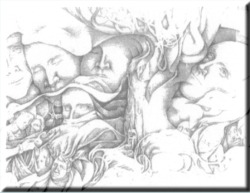to all of you, "accepted" or "rejected"
this time around, to thank you for your poems,
and also to explain in greater depth
than I could do in that brief advertisement
why I started this review, and what
I hope for from its readers and its writers.
(This is in lieu of criticism, which
some asked for, and of guidelines for next time.)
First of all, I am, like you, a poet,
but for some time have felt dissatisfied
with literary fashions that seem molded
too much by various markets, and too little
by visions of the world we’d like to make.
My view is shaped by memories of a era
when poetry was shared with friends who sought
to see the outline of a common future.
Then I heard poems, not in isolation
but as the dialogue of one great play
extending over many generations
where every one had something to contribute
and where the challenge was not to be "better"
than fellow-bard, but rather to be true
to one's own moment, one's own point upon
the continuum of human space and time --
to speak your part, whatever it might be.
Too, I've been influenced by Paul Celan,
whose work made many voices audible,
whose tragic fate seemed not just the result
of the past trauma of the Holocaust
but rather of a framework within which
his word was not allowed to make things happen.
Appalled by this, I looked toward other cultures,
read Black Elk Speaks, some Talmud, and considered
the little that is known about the Druids --
all cultures where the speakers formed a guild
with some commitment to the social welfare,
to poetry as a common enterprise
of understanding and communication.
I'd like to think that we could still rebuild this,
that it is not too late. For after all
the 'sixties were just thirty years ago,
the changes which we sought then were far-reaching --
we might have known that patience would be needed,
and willingness for long experiment.
At any rate, the poems I've selected
are those that seemed as if they might fit in
to such a dialogue -- that held some spark
of true experience or concern, conveyed
in words that came alive to tell their tale.
I have a certain preference for "form"
because I've found the forms a source of strength,
although the openness of good free verse
is something that a reader of Celan
cannot forget to honor.
If the above
has struck some chord in you, I hope you will
pursue the conversation. If I've failed
to understand your work, then please forgive me
and try again. A sample issue may
help you tune in. And last, this publication
is funded by no grants. I hope you'll feel
the company makes up for modest format,
and that you'll want to help sustain this vision
by subscribing, ordering extra copies
(besides the two contributors receive)
and sharing this with friends. The issue won't
have a "bio" section, but will print
titles of books by the contributors,
also your mailing address, if you're willing
to enter into dialogue with readers
-- please let me know.
Wishing you all the best
of vision, luck and guidance, I remain
yours sincerely,
Esther Cameron
|
|

